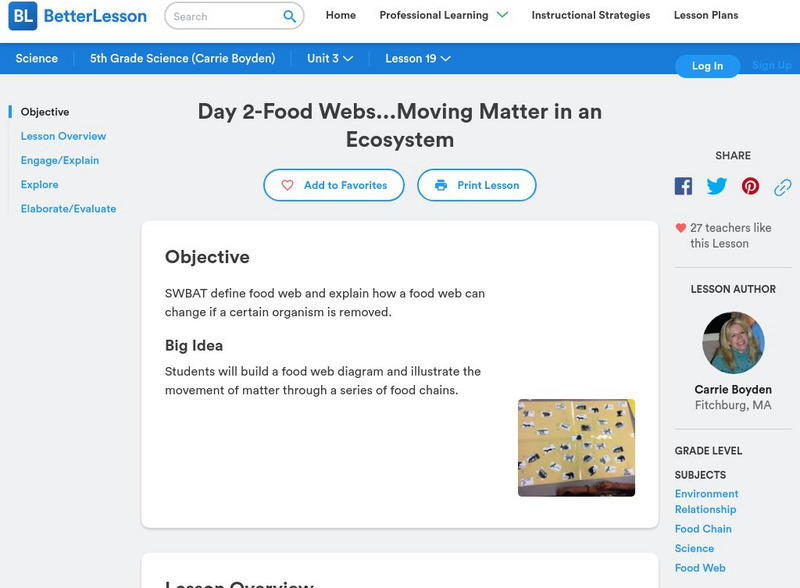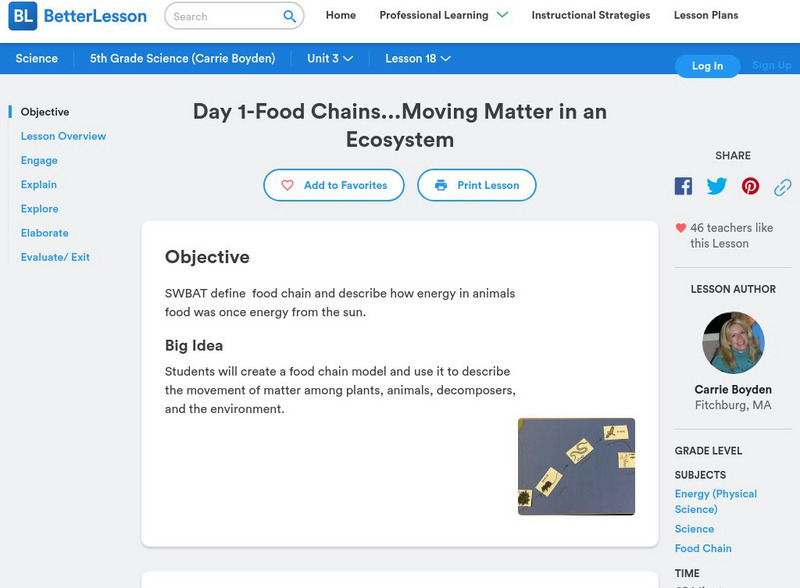Consortium for Ocean Science Exploration and Engagement (COSEE)
Plankton to Penguins: Antarctic Food Web
A well-written lesson plan, second in a series of four, gets high schoolers exploring how the Antarctic food web is impacted by climate change and the associated melting of polar ice sheets. It begins with a PowerPoint presentation about...
World Wildlife Fund
Arctic Food Chain
Explore the food chains that support Arctic ecosystems. A class discussion on interdependence and the different roles plants and animals play in ecosystems provides young scholars with the knowledge to complete a worksheet asking them to...
National Geographic
The Importance of Sharks: You Do The Math!
Elementary ecologists examine trophic relationships using a coral reef food pyramid as an example. They play a game applying math skills that ultimately demonstrate the important role of the ever-scary top predator, the shark. This is a...
Curated OER
Food Web in the Bay
Sixth graders study the food web in a bay. In this food web lesson, 6th graders investigate the SAV- submerged aquatic vegetation of a bay including their predators, and how the organisms eat, have proper living space and water. They...
Curated OER
Ecosystem Lesson Plan: Food Chain/Food Web
Students discuss ecosystems, eliciting their current knowledge of an ecosystem. Students receive an Ecosystems document and look at the picture. Students brainstorm connection between the cover picture and ecosystems. The indicated...
Curated OER
Constructing Food Chains
Learners explore different habitats and the food chains within. In this food web lesson students construct food chains for different habitats.
Curated OER
Oh, What a Tangled Web We Weave
Fifth graders investigate the food chain by viewing video clips. For this food web lesson, 5th graders investigate populations and ecosystems by viewing a video in class as well as visiting web sites. Students utilize the Internet to...
Curated OER
Web of Predators and Prey
Students investigate the food chain by researching the Internet. In this ecosystem instructional activity, students view the video "Competitor and Predator" and read a book from the series "The Magic School Bus." Students...
Curated OER
Food Web
Students identify producers and consumers, including scavengers and decomposers, and discuss role each plays in food web. They then make diagram of possible food chain that might include skull pictured on Montana's quarter, and...
Curated OER
"Leaf" It in Your Yard
Students research about the process of composting. Students apply their research by creating a compost pile at school that will be maintained once or twice a month for the remainder of the school year.
Curated OER
Food Web Lab
Students explore the predator-prey interactions and how humans have an impact on the food web. In this food lab lesson students complete a food web activity and discuss what they learned.
Curated OER
The Web of Life
Pupils explore the interconnectedness of living things in an ecosystem. They use pictures and arrows to develop a food web, and participate in constructing a class food web with students representing various parts of the web.
Curated OER
Forest Food Web
Students explore the elements of a forest ecosystem. They examine the elements needed to form a forest food web. Students construct and describe food webs that include nonliving elements of the ecosystem.
Curated OER
Food Web
Students are able to define food web, and identify the interdependence of organisms within a system. They are able to describe how natural events and human activities can impact a food web.
Curated OER
Wetlands Are Wonderlands!
Students explore the wetlands. They participate in numerous activities to explore food chains, food webs, and energy in the ecosystem. Students read stories, sing songs, visit specified websites, and participate in games to discover...
Curated OER
How do pollutants bioaccumulate and biomagnify?
Students review the basic concepts of the food chain. In small groups, they research an organism and create a food web. In addition, they study biomagnifications and write a brief essay or make a poster informing others about the...
Curated OER
Discovering New Species
Students identify animals observed by Lewis and Clark while evaluating the animal's habitat and describing the animal's behavior. Students construct a food web mobile to illustrate the animal's position in the food web in the 19th...
Curated OER
Community and Ecosystems
Students complete a unit of lessons on ecosystems. They participate in online activities, create a diorama, write journal entries, and develop a Hyperstudio multimedia project on a selected ecosystem.
Curated OER
Who Eats Whom in a Bermudian Coral Reef?
Students will be able to find out about feeding relationships on a coral reef. They then will be able to develop a food chain and food web using coral reef animals and plants using the Coral Website.
Curated OER
Web of Wonder Lesson Plan
Students learn how all living things in an ecosystem are connected in some way. By building their own "web" your class look at energy flow through the food web system and how environmental changes disrupt the system.
Curated OER
Explore the Food Web
Learners identify plants and animals in the journals of Lewis and Clark's expedition. They describe the various animal habits. Students interpret the behaviors of the animals discovered on the expedition. They design a food web using...
Better Lesson
Better Lesson: Food Webs Moving Matter in an Ecosystem(day 2)
Students will build a food web diagram and illustrate the movement of matter through a series of food chains. Resources include detailed plans, examples of student work, videos of the lesson in action, and sample food webs.
Better Lesson
Better Lesson: Food Chains Moving Matter in an Ecosystem (Day 1)
Students will create a food chain model and use it to describe the movement of matter among plants, animals, decomposers, and the environment. Resources include a detailed lesson plan, student handouts, pictures of a completed chain,...
Smithsonian Institution
Smithsonian Environmental Research Center: Forces of Change: Weaving the Web
The students will become the food web in this fun interactive classroom activity. Detailed instructions, background information, guiding questions, and activity worksheets are provided.

























